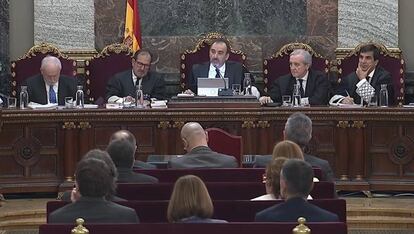An equitable trial
The Catalan separatist leaders on trial for their involvement in the 2017 secession bid have been given all the guarantees necessary for a fair verdict

After four months of hearings spread out over 52 intense sessions that included testimony from 422 witnesses and hundreds of exhibits, the Catalan separatist trial has ended and the defendants are awaiting a verdict.
Just like all the other actors involved in the proceedings, the Supreme Court has managed to dispel preliminary questions about whether the trial would offer sufficient guarantees of a fair and equitable ruling.
Pro-independence leaders have insisted on the allegedly “Francoist” nature of the court and of the Spanish justice system as a whole
Many of these doubts were deliberately planted by pro-secession activists. The Catalan premier, Quim Torra, irresponsibly described the mere fact of holding the hearings as “a farce,” and he did so on the day that the trial began.
Other pro-independence leaders have insisted on the allegedly “Francoist” nature of the court and of the Spanish justice system as a whole; they drew misleading similarities with the Turkish system; they described the justices themselves as prejudiced individuals who had already written out the verdict before even listening to the witnesses.
All of those attempts at discrediting the court have dissolved like sugar in a glass of water. The good work by the head of the Supreme Court’s criminal division, Justice Manuel Marchena, was enough to attenuate the taunts and to dispel any lingering doubts. And that’s the way the lawyers saw it, too: on Thursday, they gave the hearings a passing grade in statements to the media.
All of those attempts at discrediting the court have dissolved like sugar in a glass of water
It couldn’t have been any other way. Most, if not all of the procedural questions, have been resolved through the application of a profoundly protective legal system. If some parts of the proceedings (the exhibition of the video-based evidence) could have been a little more smooth with different scheduling, as a whole the hearings have been abundant and sufficient.
And if some of the witnesses failed to show up (because they were facing simultaneous proceedings at different courts as a result of the sprawling case being broken up into sections), leading to questions of whether this took away from the defense’s arsenal, it does not appear that anything fundamental was lost along the way – nothing that might have changed the course of the trial or undermined its impartiality. And so it is with other incidents relating to affidavits, the investigation, or the behavior displayed by some of the accusing parties.
If the defendants continue to harbor any doubts about the impartiality of the legal proceedings against them, they are always free to appeal to the European courts. But for now, the latter have already decided that the Spanish state had the full right and the inexcusable duty to defend itself from the breakaway challenge. And they have said that the Constitutional Court did the right thing when it suspended a session of the Catalan parliament aimed at declaring independence, as it had a duty to uphold Spain’s constitutional order.
Drafting the ruling will require exquisite craftsmanship
This conclusion by the European Court of Human Rights is critical, because it breathes new credibility into Spain’s justice system and its division of powers. It also validates the democratic efficiency of the Spanish rule of law, which has been questioned so often in the recent past. Respect for the institutions has won its first major test.
The second big test will come when the Supreme Court judges draft a ruling, one that will require exquisite craftsmanship. There are problems at many levels: setting the exact boundaries of the facts under scrutiny; gauging the aptness of the various charges leveled against the defendants (rebellion, sedition, misuse of public funds); and grading the various degrees of individual accountability for the actions in question.
In any event, the road traveled to reach this final point has been irreproachable, and there is nothing to suggest that the verdict will not be so as well.
English version by Susana Urra.
Tu suscripción se está usando en otro dispositivo
¿Quieres añadir otro usuario a tu suscripción?
Si continúas leyendo en este dispositivo, no se podrá leer en el otro.
FlechaTu suscripción se está usando en otro dispositivo y solo puedes acceder a EL PAÍS desde un dispositivo a la vez.
Si quieres compartir tu cuenta, cambia tu suscripción a la modalidad Premium, así podrás añadir otro usuario. Cada uno accederá con su propia cuenta de email, lo que os permitirá personalizar vuestra experiencia en EL PAÍS.
¿Tienes una suscripción de empresa? Accede aquí para contratar más cuentas.
En el caso de no saber quién está usando tu cuenta, te recomendamos cambiar tu contraseña aquí.
Si decides continuar compartiendo tu cuenta, este mensaje se mostrará en tu dispositivo y en el de la otra persona que está usando tu cuenta de forma indefinida, afectando a tu experiencia de lectura. Puedes consultar aquí los términos y condiciones de la suscripción digital.








































